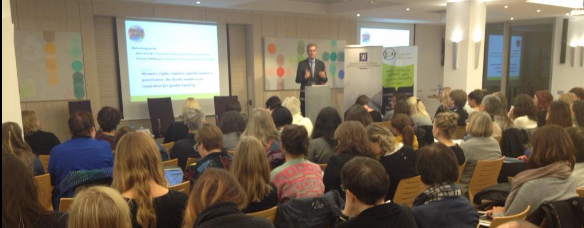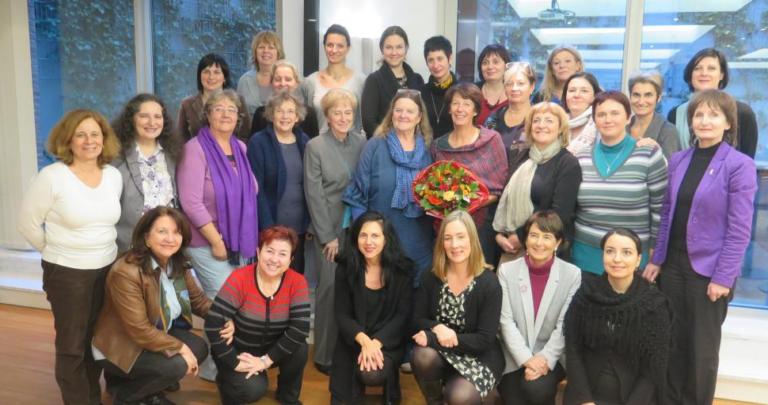[Brussels, 21 March 2011] The EWL welcomes the adoption today by the Council of the new Directive on trafficking in human beings. This Directive has a victims’ centered approach and stresses the need to take into account the gender perspective in its provisions (article 1). The EWL welcomes the acknowledgment of the gender impact of trafficking and will work towards delivering more concrete information on how the gender perspective should translate in the forthcoming EU strategy on trafficking.
It remains however a matter of concern to the EWL and its members how the EU and the Member States are going to translate the Directive, in particular regarding the provisions on prevention, as the Directive does not provide for benchmarks or indicators to assess the concrete and efficient implementation of the proposed goals (reduce and discourage the demand that fosters all forms of exploitation related to trafficking, through education and training). The EWL also wishes to see concrete monitoring, including infringement and sanctions procedures when the Directive is not duly and fully translated into national law.
Finally, the EWL continues to maintain that this Directive should be implemented in the framework of the UN 1949 Convention for the Suppression of the Traffic in Persons and of the Exploitation of the Prostitution of Others, which has been ratified by 18 EU Member States. We hope to see some Member States take the lead in addressing demand for prostitution, and go beyond the theoretical provision of article 18.4, by criminalising the purchase of sex with or without the knowledge that the person is a victim of trafficking. Without such a strong political commitment, the root causes of trafficking will not be tackled efficiently.
European Commission Press Release, Brussels, 21 March 2011
The European Commission welcomes the adoption today by the Council of a new directive on trafficking in human beings. The adoption follows a Commission Directive proposal last spring, with binding legislation to prevent trafficking, to effectively prosecute criminals, and to better protect the victims, in line with the highest European standards.
“This is a very important step towards a comprehensive and more effective European anti-trafficking policy. I would like to thank the Council and the European parliament for the swift adoption of this directive. The new ambitious rules adopted today will keep the EU at the forefront of the international fight against human trafficking by protecting the victims and punishing the criminals behind this modern slavery”, said Cecilia Malmström, Commissioner for Home Affairs.
“Trafficking affects the most vulnerable. It is a crime against the human rights of all the women, men, and children traded for the purpose of sexual or labour exploitation, removal of organs, begging, and other illegal activities. The numbers are frightening. Several hundred thousand of people are trafficked into the EU or within the EU every year. With this directive, the EU is sending a clear message that it will not tolerate those engaging in any part of the trafficking process and that it will ensure that victims are fully protected and given the opportunity to recover and re-integrate into society”, said Myria Vassiliadou, EU Anti Trafficking Coordinator.
The new Directive takes a victim centred approach, including a gender perspective, to cover actions in different areas such as criminal law provisions, prosecution of offenders, victims’ support and victims’ rights in criminal proceedings, prevention and monitoring of the implementation.
The criminal law provisions include a common definition of the crime, as well as aggravating circumstances, higher penalties and the principle of non-punishment of the victims for unlawful activities – such the use of false documents – in which they have been involved when subjected to traffickers.
In terms of the prosecution of offenders, the Directive establishes, among others, the possibility to prosecute EU nationals for crimes committed in other countries and to use investigative tools typical for fighting organised crime such as phone tapping and tracing proceeds of crime.
The Directive provides for specific treatment of particularly vulnerable victims aimed at preventing secondary victimisation (no visual contact with the defendant), no questioning on private life, no unnecessary repetition of the testimony, etc). It also provides for police protection of victims, and legal counselling to enable victims to claim compensation. Special protective measures are envisaged for children (such as holding interviews in a friendly environment).
Victims’ support includes national mechanisms for early identification and assistance to victims, based on cooperation between law enforcement and civil society organisations, providing victims with shelters, medical and psychological assistance, information and interpretation services. A victim is to be treated as such as soon as there is an indication that she/he has been trafficked. A victim will be provided with assistance before, during and after criminal proceedings.
Prevention aspects cover measures discouraging the demand that fosters trafficking as well as awareness raising and trainings aimed at the officials likely to come into contact with victims, and potential victims to warn them about the risks of falling prey to traffickers.
Monitoring of the implementation of the measures foreseen by the Directive should be ensured by National Rapporteurs or equivalent mechanisms. These independent bodies should have further tasks including giving advice and addressing recommendations to governments.
Background
On 29 March 2010 the European Commission tabled its proposal for a new Directive on trafficking in human beings (IP/10/380). It follows up on a previous proposal tabled in 2009. The final text of the Directive is a constructive compromise that strengthens the EU response in the work against human trafficking. Once implemented, the Directive will ensure consistency among national definitions of crimes and level of penalties. Member States now have two years to transpose the new rules into their national legislation. The European Parliament voted with a strong majority in favour of the Directive on the 14th of December.
The new Directive replaces current EU legislation dating from 2002 (Framework Decision 2002/629/JHA) and will apply to all Member States but Denmark and the United Kingdom
In December 2010, the Commission appointed Ms Myria Vassiliadou to the position of European Anti-Trafficking Coordinator. Her task is to improve coordination and coherence between EU institutions, EU agencies, Member States, third countries and international actors in the field of Anti trafficking (IP/10/1715). The Commission also launched an EU Anti-Trafficking website, www.ec.europa.eu/anti-trafficking, with the aim of becoming a one stop shop for practitioners, civil society, academics and others interested in the problem of trafficking.
For more information
Download the Directive from the EU Official Journal: http://eur-lex.europa.eu/JOHtml.do?uri=OJ:L:2011:101:SOM:EN:HTML
Homepage of Cecilia Malmström, Commissioner for Home Affairs:
http://ec.europa.eu/commission_2010-2014/malmstrom/welcome/default_en.htm
Homepage of DG Home Affairs:
http://ec.europa.eu/dgs/home-affairs/index_en.htm
EU Anti Trafficking website:
http://ec.europa.eu/anti-trafficking/index.action
Note
EU Anti-Trafficking Coordinator Myria Vassiliadou served as Secretary General of the European Women’s Lobby from 2007-2010.



